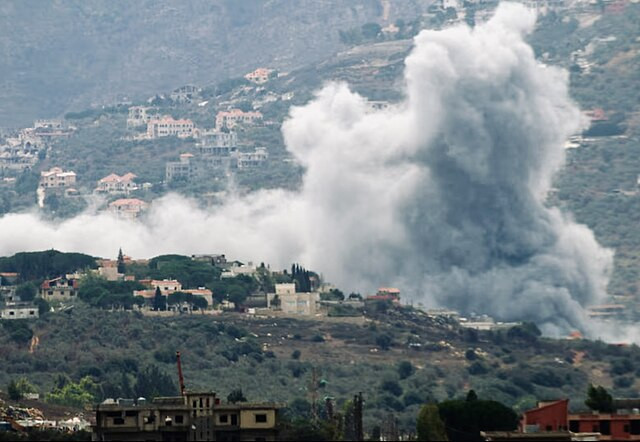Israeli forces intensified their military campaign against Hezbollah in Lebanon this week, killing a senior Hezbollah commander in an airstrike on Beirut on Tuesday. The Israeli Defense Forces (IDF) confirmed that the strike targeted Ibrahim Muhammad Qabisi, the commander of Hezbollah's missiles and rockets division, in a significant blow to the Iran-backed militant group. Qabisi's death marks the second Hezbollah commander killed by Israeli strikes in Beirut in less than a week, as both sides exchange heavy fire, raising fears that the ongoing conflict could escalate into a broader regional war.
Israel's strike in Beirut followed days of intense military activity, with the IDF hammering hundreds of Hezbollah targets across Lebanon. This includes the death of another key figure, Ibrahim Aqil, who was the head of Hezbollah's operations and commander of its elite Radwan Force, killed in a separate strike on Friday. Israeli forces have now conducted five targeted airstrikes on Beirut since the outbreak of the Israel-Hamas war, with three of those airstrikes occurring in the past five days.
On Tuesday, Hezbollah responded by launching missiles at eight Israeli targets, escalating the conflict further. The Israeli military reported tracking approximately 100 projectiles fired from Lebanon into northern Israel. Meanwhile, Lebanese officials reported that Israeli airstrikes on Monday had killed at least 558 people, including women and children, underscoring the heavy toll the conflict is taking on civilians in Lebanon.
The strikes come as Lebanon faces another wave of deadly explosions, which have been blamed on Israel, though the Israeli government has not confirmed its involvement. The explosions targeted hundreds of communication devices used by Hezbollah members, further weakening the group. Hezbollah has vowed not to back down, declaring that it will continue to fight until a ceasefire is reached in Gaza, where Israel is waging a separate war against Hamas.
The conflict has placed Lebanon in a precarious position, as the country teeters on the brink of a full-scale war. Israeli Prime Minister Benjamin Netanyahu, visiting an army base on Tuesday, reiterated Israel's resolve to target Hezbollah while urging Lebanese citizens to distance themselves from the militant group. "Our war is not with you; our war is with Hezbollah. Nasrallah is leading you to the brink of the abyss," Netanyahu said, referring to Hezbollah's leader, Hassan Nasrallah. "Rid yourself from Nasrallah's grip, for your own good."
Netanyahu warned that homes harboring Hezbollah's weapons would be targeted, echoing accusations that the group has been storing rockets and ammunition in civilian areas-claims that Hezbollah denies. The Lebanese government said that Tuesday's airstrike on the Ghobeiry neighborhood in Beirut killed at least six people and wounded 15 others, further inflaming tensions in the capital.
The humanitarian toll of the conflict is mounting. Lebanese officials reported that Israeli airstrikes on Monday killed 558 people, including 50 children and 94 women. Additionally, 1,835 people were wounded, and over 27,000 have been displaced. Displaced families are seeking shelter in makeshift accommodations, while others endure long journeys on the road, trying to escape the violence. "We felt as if we were in a war, a very difficult war," said Rima Ali Chahine, a Beirut resident who fled to a shelter.
Despite the devastation, some in Beirut remain defiant. "They (Israel) want us to kneel, but we kneel only to God in our prayers; we bow our heads to no one but God," said Afif Ibrahim, a taxi driver from southern Lebanon. This sentiment reflects a broader sense of resistance among Hezbollah's supporters as the conflict drags on.
The growing instability has prompted renewed calls for diplomacy from international leaders. UN Secretary-General António Guterres warned that Lebanon is at a critical juncture, saying, "Lebanon is at the brink. The people of Lebanon, the people of Israel, and the people of the world cannot afford Lebanon to become another Gaza." Guterres and others, including White House National Security Adviser Jake Sullivan, urged all parties to seek a path toward de-escalation, fearing that the conflict could draw in other regional powers, particularly Iran.
The risk of a broader Middle East war involving Iran, Hezbollah's primary backer, and other Iranian-aligned groups across the region-such as Yemen's Houthis and armed militias in Iraq-looms large. Hezbollah has already suffered significant setbacks in recent weeks, including the destruction of thousands of communication devices in what has been described as one of the worst security breaches in the group's history. While Israel has not confirmed its role in this operation, the attack underscores the high stakes in the ongoing intelligence and military battle between Israel and Hezbollah.




